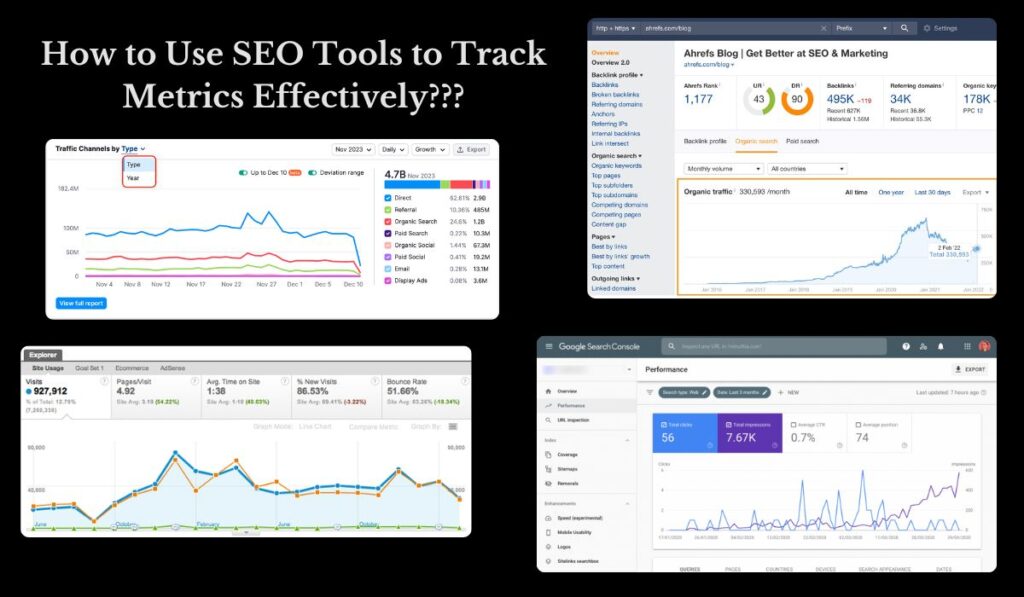The Digital Marketing world is constantly evolving, and so is SEO. Search Engines are constantly evolving themselves, and staying on top of this latest SEO Trend, 2025, is very difficult. SEO has become so important for enhancing and maintaining our online presence.
In our previous blog, we have learned basic to advanced level SEO, and in this Blog, we will learn more about important SEO metrics and tools that will help us keep track of our SEO success.
Additionally, we will look ahead to SEO Trends in 2025 and how we should modify our strategies in accordance with Google algorithm updates. This guide will provide valuable insights into optimizing your strategies to rank first on SERPs.
Why SEO Measurement is crucial in 2025?
With ongoing Algorithm updates and the complexities of SEO, it is not enough to track ranking alone. But we need to keep a close eye on other SEO Metrics that reflect SEO Performance and User Experience.
If we learn how to grasp useful insites using various tools, we can stay competitive and easily adapt to new changes effortlessly.
SEO 2025 is way more data-driven than ever, with seo trends shifting toward Artificial intelligence, Voice Search, and User Experience. It will be advantageous to know how to pick crucial information using SEO Tools to stay one step ahead.
Top SEO Metrics we must use in 2025
SEO Success involves measuring several key factors that indicate how well our website is performing, or what changes we must adapt to. Here we are discussing key factors of SEO.
- Organic Traffic: This Metric shows how many visitors are coming to our website from Search Engine Result Pages. (Excluding Paid Ads). An Increase in Organic Traffic indicates your SEO Efforts are paying off.
-
Bounce Rate & Dwell Time: These core Metrics show user engagement and interaction time with your website.
- Bounce Rate refers to users leaving your site quickly, a high bounce rate could mean your content should be upgraded or the user experience interface needs improvement.
- Dwell Time is the time that the user spends on your website. A longer dwell time generally indicates high-quality content and a positive user experience.
- Tracking Keyword Ranking is crucial for understanding how well your website page performs in SERPs.
- Conversion rate measures how many users take desired action on your website such as getting queries or making purchases.
- Domain Authority (DA) is a score that predicts how reputed or reliable a website is in the eyes of Search Engines.
- Backlinks, This can be understood as a vote of confidence, enhance online presence, and increase Domain Authority.
- Click Through Rate (CTR), this metric represents how often a user clicks on your website in SERPs. High CTR indicates the meta tags are compelling and relevant to users’ queries.
Best Free and Premium SEO Tools to Measure Success

There are various SEO Tools available that can help in keeping track of our SEO Success. Here is a brief breakdown of the Best Free SEO Tools and Best Paid SEO Tools.
Free SEO Tools:
- Google Analytics: This tool is provided by Google itself. It helps in keeping real-time track of the data such as traffic, active users, conversion rate, etc.
- Google Search Console: GSC offers insights into a website’s performance in search results, it also tells us about ongoing issues such as indexing and crawling issues.
- Ubersuggest: It is a free tool that helps in keyword analysis, backlink data, and site audits.
- Moz (Free Tools): Moz offers a limited set of free tools for keyword research, link building, and on-page optimization.
Paid SEO Tools
- Ahref: This is one of the most popular and commonly used tools. Its free version allows us to check Domain Authority, Backlinks, and keyword volume checks, whereas its paid version allows you to track backlinks and keyword rankings.
- SEMrush: This is the best tool considered for SEO Audit, Keyword research, and competitor analysis all in one place.
- Screaming Frog: This is website Crawling tool that gives you in-depth SEO Audits and help in identifying broken links, duplicate content, and page loading speed.
- Majestic: A premium tool helps in backlink analysis, helping you track your website’s link profile.
- Serpstat: Offers keyword tracking, backlink analysis, and site audit features to measure SEO success.
| Tool | Free Version | Paid Version | Key Features |
|---|---|---|---|
| Google Analytics | Yes | No | Traffic Analysis, Conversions |
| Ahrefs | Yes | Yes | Backlinks, Organic Traffic |
| SEMrush | No | Yes | Keyword Research, Competitor Analysis |
| Moz | Yes | Yes | Keyword Research, Link Building |
SEO Trends in 2025

SEO is constantly evolving and we must adapt to the ongoing waves to stay ahead. 2025 brings us new challenges in the form of Google Core updates. Here are the top trends to keep an eye on:
- AI and SEO
Artificial Intelligence has a strong influence on SEO 2025. AI-powered search engines and tools will make it a lot easier to automate processes like keyword research, Content Creation, and Tracking Performance.
- Voice Search Optimisation
Voice-activated devices like Google Home & Alexa, are optimized for voice command search which makes it way more easier to search and find accurate results. Voice queries tend to be longer and more conversational, so adapting to voice search SEO is crucial.
- Mobile-First Indexing
Google’s mobile-first indexing can be understood as Google prioritizing websites that are mobile-friendly, as the majority (92%) of the traffic to Google comes from mobile devices. So it becomes of utmost importance to make your website mobile user-friendly.
Here is a reference of Search Engine Landing on Mobile First Indexing
- User Experience as Ranking Factor
In 2025, Google prioritizes user experience the most. Making your content user-friendly and engaging is the first rule in SEO on-page strategy. To enhance User Experience, you must take care of page loading speed, and quality content, and for this, you must understand what Search Intent is. Here is my blog in which we have learned about Search Intents.
- Video Content and SEO
Video content is a key player in enhancing user experience and increasing engagement time. Search engines now prioritize video in search results, and platforms like YouTube, Instagram, TikTok, etc are becoming search engines in their own right.
How to Use SEO Tools to Track Metrics Effectively?

Using the right tool to drive the right information and making the right strategy is crucial in SEO’s ongoing trends in 2025. Here is how you can use most of the popular SEO tools.
- Google Analytics
- Track website traffic, user behavior, and session duration.
- Analyze bounce rate and conversion goals for performance insights.
- Measure traffic sources (organic, referral, direct) to understand user acquisition.
- Google Search Console
- Monitor keyword rankings and search performance (Impressions, CTR).
- Identify indexing issues and submit sitemaps.
- Track click-through rates (CTR) and average position for keywords.
- Ahrefs
- Analyze backlink profiles and referring domains.
- Track keyword ranking fluctuations across regions.
- Conduct competitor analysis to identify keyword gaps.
- SEMrush
- Monitor organic keyword positions and visibility trends.
- Analyze on-page SEO issues with site audits.
- Track domain authority and backlink growth over time.
- SERanking
- Track keyword rankings across different search engines.
- Conduct website audits to detect technical SEO issues.
- Monitor competitors’ SEO strategies and keyword performance.
By mastering these tools, you’ll not only track metrics effectively but also boost your SEO strategy to new heights
Now let us see, what these tools are capable of, Let us take an example of a company, say “Acquiresavvy” that implemented the SEO strategy. Now after 3 months, Acquiresavvy observe
- A 30% increase in organic traffic
- A 20% reduction in bounce rate
- A 15% increase in conversions from blog content
These results were measured using Google Analytics, Google Search Console and SEMrush. By tracking these metrics, Acquiresavvy was able to refine its content strategy and achieve better results.
Actionable Tips for Measuring SEO Success in 2025
- Keep SEO Tracking a Habit
SEO isn’t a one-time effort—it’s an ongoing journey. Set up monthly or quarterly check-ins to review your progress and stay aligned with your goals.
- Stay Ahead with SEO Trends
SEO is always evolving. Keep an eye out for new trends and updates, and tweak your strategy to stay competitive.
- Turn Data into Action
Tracking metrics is only half the job—use those insights to fine-tune your approach, improve performance, and get better results!
So if you’re looking to get higher Google rankings, this guide is for you.
Conclusion
As SEO evolves rapidly, staying competitive means constantly learning, adapting, and optimizing. By effectively using key metrics and tools, we can track our progress, make data-driven decisions, and fine-tune our strategy for better results. Remember, SEO success isn’t just about rankings—it’s about creating a valuable user experience that keeps visitors engaged and coming back for more.
Looking ahead, the road doesn’t end here. In our upcoming blogs, we’ll dive deeper into topics like avoiding common SEO mistakes, boosting traffic with effective strategies, and much more. So, stay tuned—there’s a lot more to discover in your journey toward mastering SEO in 2025!
Frequently Asked Questions {FAQs}
The most important metrics for SEO include organic traffic, keyword rankings, conversion rates, bounce rates, and backlinks.
It’s recommended to track SEO metrics regularly, at least monthly, to stay on top of performance and make necessary adjustments.
Google Analytics and Ubersuggest are great starting points for beginners due to their user-friendly interfaces and powerful insights.

